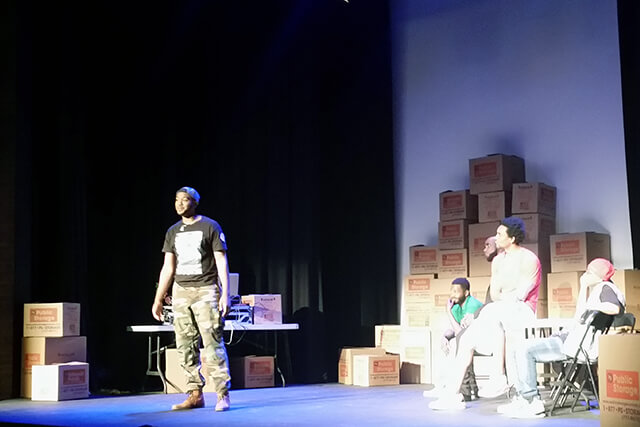“Soulful.”
“It’s just the truth, it’s one of my favourite plays.”
“I look forward to seeing more from the writer and what he does in the future.”
Those were just a few of the sentiments heard from audience members leaving the showing of Secrets of a Black Boy at the Maja Prentice Theatre in Mississauga, ON Tuesday night.
Six years after its initial debut, Darren Anthony’s hard-hitting comedic drama was still met by positive feedback from the crowd that gathered to watch the first show of a tour that will eventually move on to major American cities like Baltimore and Washington, D.C.
The play touches on a number of controversial themes that exist within the black community, but are rarely discussed within the public sphere. No topic is off limits as the drama portrays the everyday struggles of what it is like to be a black man within society today.
“We don’t really discuss the hard-hitting issues, issues like suicide, transgender, sexuality,” explains Anthony. “… I wanted to be a voice for the voiceless, [for] my peers, as well as the youth that I work with.”
“I find as a black man, we’ve conditioned ourselves to be strong as nails, not have any emotions or talk about our issues and those qualities are very problematic.” – Darren Anthony
The plot follows five black men as they reveal intimate accounts of events that have taken place within their lives over one last game of dominoes at their local recreational centre – right before it is scheduled to be torn down. Each of the characters represents a man at a different point in his life, who is going through problems that he has never been able to share with his peers.
Anthony says that this fear of opening up to one another served as a huge motivator behind his desire to be the one to start a dialogue on a lot of the issues covered.
“I find as a black man, we’ve conditioned ourselves to be strong as nails, not have any emotions or talk about our issues and those qualities are very problematic,” he says, adding, “I want to make sure that men seeing this realize that they can articulate their feelings and they can be vulnerable.”

Breaking Out of Society’s ‘Sanctions’
The play gives viewers an in-depth look into the mind of a black man through a series of soliloquies, in which characters are able to share their innermost feelings. The pent-up emotion explodes from within the actors on stage as they reveal a side of them that is rarely, if ever, seen.
This was something that clearly resonated with several audience members including Lavelle Adams Grey, a post-secondary student who made the trip from Brampton to see the production.
“[The aspect that] I could relate to most, [would have to have been] trying to adapt to what society makes out of us as being a black man.” – Lavelle Adams Grey
“[The aspect that] I could relate to most, [would have to have been] trying to adapt to what society makes out of us as being a black man,” says Grey. “Trying to come up on your own and society putting sanctions on what you can do and trying to break out of that.”
The tension built up during the play’s dramatic scenes eventually eased through comedic interludes that provided a laugh without straying too far from the topics at hand. Edgy one-liners like, “If there wasn’t a black man around, a cop wouldn’t have a job,” kept the mood light during some very pressing discussions.
First-time viewer, Jeleesa Walker, commended the actors and Darren on this, stating, “They connected with the audience and not every movie or play that you see connects with the audience like that. They incorporate the crowd so that keeps your attention and keeps you happy.”
More Storytellers Needed
While Anthony indicates he had several motivators, he credits his older sister, Trey Anthony, as one of his biggest inspirations.
Trey, also a successful playwright, is most notably known as the mastermind behind the award-winning, da Kink in My Hair, which focuses on the difficulties black women must face and has since been remade into a television series. She was the one who initially challenged her brother to write about a lot of these issues from a black male’s perspective – something rarely seen within media outlets. Anthony’s continued appreciation for his sister’s support was put on full display during an emotional embrace following the conclusion of the play.
“I find that when it comes to urban stories, there’s a lot of people who are telling our stories, but they don’t come off as being authentic.” – Darren Anthony
Moving forward, Anthony says that in order for more realistic portrayals of black men to become prevalent within the media, more individuals from within these communities must step up as storytellers.
“I find that when it comes to urban stories, there’s a lot of people who are telling our stories, but they don’t come off as being authentic,” Anthony says. “And I wanted to make sure that I was that individual, being in social work and being a storyteller for so many years, I have some credibility and I know what I am talking about, I’m on the front lines.”
A business enthusiast with a passion for implementing processes that improve the world around me.





